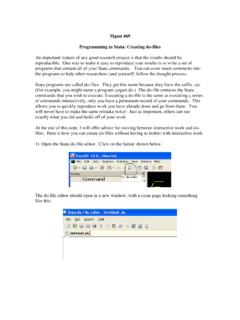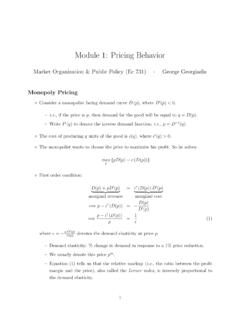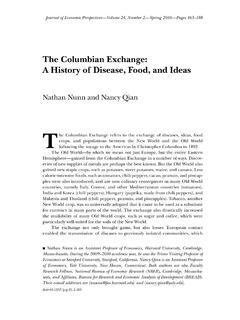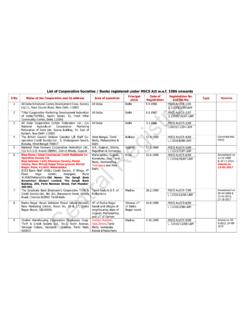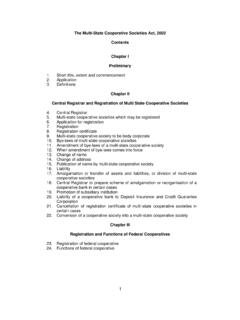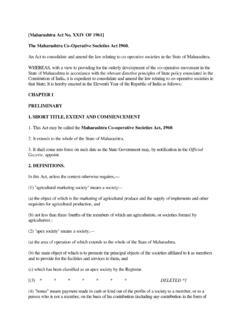Transcription of Introduction to Economic Analysis - Kellogg School of ...
1 Introduction to Economic Analysis 1-1 Introduction to Economic Analysis Version R. Preston McAfee;Tracy Lewis;Donald J. Dale Introduction to Economic Analysis 1-2 Introduction to Economic Analysis 1-3 About the Authors ABOUT R. PRESTON MCAFEE R. Preston McAfee received his undergraduate degree in economics from the University of Florida, and master of science in mathematics, and a in economics from Purdue University. McAfee is the J. Stanley Johnson Professor of Business, Economics & Management at Caltech. He is on leave from Caltech and currently is Chief Economist at Microsoft. The author of many academic papers on auctions, McAfee was one of the designers of the Federal Communication Commission s first auction of radio spectrum rights for cellular phones. Over $100 billion worth of airwaves and other items have been sold using this auction design.
2 He has run auctions in Mexico and advised several governments on auction use. McAfee served as an Economic expert in a variety of antitrust cases, including Exxon-Mobil, BP-Arco, Lockheed Martin-Northrop Grumman, and Peoplesoft-Oracle. He also testified in the versus Rambus, and has testified before three United States Senate committees on antitrust enforcement and gasoline pricing. ABOUT TRACY R. LEWIS Tracy R. Lewis is the Martin L Black Professor of Business Administration at the Fuqua School of Business, Duke University, and Director of the Duke University Innovation Center. Other positions held by Dr. Lewis include: James Walter Eminent Scholar in Economics, University of Florida, and Associate Director of Energy Studies, Public Utilities Research Center, Director, Program on Workable Energy Regulation (POWER), Professor of Economics, University of California, Davis, Professor of Economics, University of British Columbia, Assistant Director, Program in Natural Resource Economics, Visiting Associate Professor of Economics, California Institute of Technology, Associate Professor of Economics, University of British Columbia, Brookings Fellow, Washington, DC, Visiting Assistant Professor, University of British Columbia, Assistant Professor, University of Arizona.
3 In addition to the roles above, Dr. Lewis has served as Economic Advisor for the National Research Council, Academy of Sciences. He has been a consultant to numerous organizations including the Florida Attorney General s Office, the World Bank Project on Abatement of Greenhouse Gases, Florida Power and Light Company, FTC, Department of Energy, the Rand Corporation, and many others. Dr. Lewis has published two books, numerous articles, and has served as editor on a wide range of journals including: the Journal of Law Economics and Organization, The B. E. Journals in Industrial Organization, and Review of Network Economics to name a few. He has been awarded over 15 grants, fellowships and awards. Tracy earned his BA and PhD at the University of California, San Diego. ABOUT DONALD J. DALE Donald J. Dale is Clinical Associate Professor of Economics at the Kellogg School of Management at Northwestern University.
4 The winner of several teaching awards, he has taught microeconomics for 24 years. He is interested in experimental Economic methods for both research and pedagogy. Dr. Dale has conference presentations and publications in the fields of game theory, experimental economics, and experimental psychology. Dr. Dale received his undergraduate degree from the University of Delaware, and his MS and from Princeton University. Introduction to Economic Analysis 1-4 Contents 1 WHAT IS ECONOMICS? .. 1-8 NORMATIVE AND POSITIVE THEORIES .. 1-8 OPPORTUNITY COST .. 1-9 Economic REASONING AND Analysis .. 1-11 2 SUPPLY AND DEMAND .. 2-14 DEMAND AND CONSUMER SURPLUS .. 2-14 SUPPLY AND PROFIT .. 2-19 MARKET DEMAND AND SUPPLY .. 2-22 EQUILIBRIUM .. 2-23 CHANGES IN DEMAND AND SUPPLY .. 2-24 3 QUANTIFICATION .. 3-28 ELASTICITY .. 3-28 SUPPLY AND DEMAND CHANGES .. 3-30 4 THE US ECONOMY.
5 4-33 BASIC DEMOGRAPHICS .. 4-33 EDUCATION .. 4-39 HOUSEHOLDS AND CONSUMPTION .. 4-41 PRODUCTION .. 4-47 GOVERNMENT .. 4-55 TRADE .. 4-63 FLUCTUATIONS .. 4-66 5 GOVERNMENT INTERVENTIONS .. 5-69 EFFECTS OF TAXES .. 5-69 INCIDENCE OF TAXES .. 5-72 EXCESS BURDEN OF TAXATION .. 5-73 PRICE FLOORS AND CEILINGS .. 5-74 THE POLITICS OF PRICE CONTROLS .. 5-79 PRICE SUPPORTS .. 5-82 QUANTITY RESTRICTIONS AND QUOTAS .. 5-83 6 6-85 PRODUCTION POSSIBILITIES FRONTIER .. 6-85 COMPARATIVE AND ABSOLUTE ADVANTAGE .. 6-88 FACTORS OF PRODUCTION .. 6-90 INTERNATIONAL TRADE .. 6-91 Introduction to Economic Analysis 1-5 7 EXTERNALITIES .. 7-93 EXTERNAL 7-93 PIGOUVIAN TAXES .. 7-97 QUOTAS .. 7-98 TRADABLE PERMITS AND AUCTIONS .. 7-99 COASIAN BARGAINING .. 7-100 FISHING AND EXTINCTION .. 7-101 8 PUBLIC GOODS .. 8-105 FREE-RIDERS .. 8-105 PROVISION WITH TAXATION.
6 8-107 LOCAL PUBLIC GOODS .. 8-108 9 PRODUCER THEORY: COSTS .. 9-110 TYPES OF FIRMS .. 9-110 PRODUCTION FUNCTIONS .. 9-112 PROFIT 9-115 THE SHADOW 9-119 INPUT DEMAND .. 9-120 MYRIAD COSTS .. 9-122 10 PRODUCER THEORY: DYNAMICS .. 10-125 REACTIONS OF COMPETITIVE FIRMS .. 10-125 ECONOMIES OF SCALE AND SCOPE .. 10-127 DYNAMICS WITH CONSTANT COSTS .. 10-130 GENERAL LONG-RUN DYNAMICS .. 10-135 11 INVESTMENT .. 11-140 PRESENT VALUE .. 11-140 INVESTMENT .. 11-143 INVESTMENT UNDER UNCERTAINTY .. 11-144 RESOURCE EXTRACTION .. 11-148 A TIME TO HARVEST .. 11-149 COLLECTIBLES .. 11-151 SUMMER WHEAT .. 11-155 12 CONSUMER THEORY .. 12-157 UTILITY MAXIMIZATION .. 12-157 BUDGET OR FEASIBLE SET .. 12-158 INDIFFERENCE CURVES .. 12-161 EXAMPLES .. 12-164 SUBSTITUTION EFFECTS .. 12-166 INCOME EFFECTS .. 12-169 Introduction to Economic Analysis 1-6 MATHEMATICAL CLEANUP.
7 12-172 13 APPLIED CONSUMER THEORY .. 13-174 LABOR SUPPLY .. 13-174 URBAN REAL ESTATE PRICES .. 13-178 DYNAMIC CHOICE .. 13-181 RISK AVERSION .. 13-185 SEARCH .. 13-189 14 GENERAL EQUILIBRIUM .. 14-192 EDGEWORTH BOXES .. 14-192 EQUILIBRIUM WITH PRICE SYSTEM .. 14-195 GENERAL EQUILIBRIUM .. 14-199 15 MONOPOLY .. 15-205 SOURCES OF 15-205 BASIC Analysis .. 15-206 EFFECT OF TAXES .. 15-209 PRICE DISCRIMINATION .. 15-210 WELFARE EFFECTS .. 15-213 NATURAL MONOPOLY .. 15-214 PEAK LOAD PRICING .. 15-215 16 GAMES & STRATEGIC BEHAVIOR .. 16-218 MATRIX GAMES .. 16-218 NASH EQUILIBRIUM .. 16-221 MIXED STRATEGIES .. 16-223 EXAMPLES .. 16-226 SUBGAME PERFECTION .. 16-229 SUPERGAMES .. 16-232 17 IMPERFECT COMPETITION .. 17-235 COURNOT OLIGOPOLY .. 17-235 COURNOT INDUSTRY PERFORMANCE .. 17-237 HOTELLING DIFFERENTIATION .. 17-239 THE CIRCLE MODEL.
8 17-241 18 INFORMATION .. 18-244 MARKET FOR LEMONS .. 18-244 MYERSON-SATTERTHWAITE THEOREM .. 18-245 SIGNALING .. 18-247 SEARCH AND PRICE DISPERSION .. 18-248 19 AGENCY THEORY .. 19-252 PRINCIPALS AND AGENTS .. 19-252 Introduction to Economic Analysis 1-7 COST OF PROVIDING INCENTIVES .. 19-254 19-256 MULTI-TASKING WITHOUT HOMOGENEITY .. 19-259 20 AUCTIONS .. 20-262 ENGLISH AUCTION .. 20-262 SEALED-BID AUCTION .. 20-263 DUTCH AUCTION .. 20-265 VICKREY AUCTION .. 20-266 THE WINNER S CURSE AND LINKAGE .. 20-267 AUCTION DESIGN .. 20-270 21 ANTITRUST .. 21-272 SHERMAN ACT .. 21-272 CLAYTON ACT .. 21-273 PRICE-FIXING .. 21-275 MERGERS .. 21-276 22 SOLUTIONS TO EXERCISES .. 22-280 Introduction to Economic Analysis 1-8 1 What is Economics? Economics studies the allocation of scarce resources among people examining what goods and services wind up in the hands of which people.
9 Why scarce resources? Absent scarcity, there is no significant allocation issue. All practical, and many impractical, means of allocating scarce resources are studied by economists. Markets are an important means of allocating resources, so economists study markets. Markets include stock markets like the New York Stock Exchange, commodities markets like the Chicago Mercantile, but also farmer s markets, auction markets like Christie s or Sotheby s (made famous in movies by people scratching their noses and inadvertently purchasing a Ming vase) or eBay, or more ephemeral markets, such as the market for music CDs in your neighborhood. In addition, goods and services (which are scarce resources) are allocated by governments, using taxation as a means of acquiring the items. Governments may be controlled by a political process, and the study of allocation by the politics, which is known as political economy, is a significant branch of economics.
10 Goods are allocated by certain means, like theft, deemed illegal by the government, and such allocation methods nevertheless fall within the domain of Economic Analysis ; the market for marijuana remains vibrant despite interdiction by the governments of most nations. Other allocation methods include gifts and charity, lotteries and gambling, and cooperative societies and clubs, all of which are studied by economists. Some markets involve a physical marketplace. Traders on the New York Stock Exchange get together in a trading pit. Traders on eBay come together in an electronic marketplace. Other markets, which are more familiar to most of us, involve physical stores that may or may not be next door to each other, and customers who search among the stores, purchasing when the customer finds an appropriate item at an acceptable price. When we buy bananas, we don t typically go to a banana market and purchase from one of a dozen or more banana sellers, but instead go to a grocery store.




